|
October 29, 2020 - No. 74
Striking Alberta Hospital Workers Ordered Back to Work
Abolish the Unlimited Powers of the Alberta Labour Relations Board
- Dougal MacDonald -
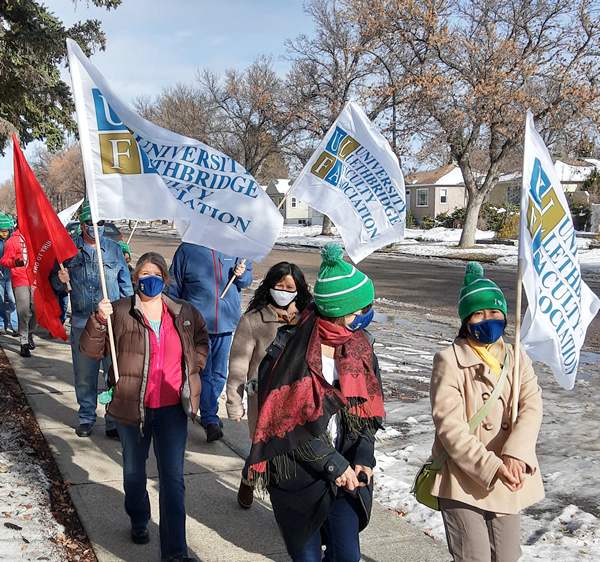 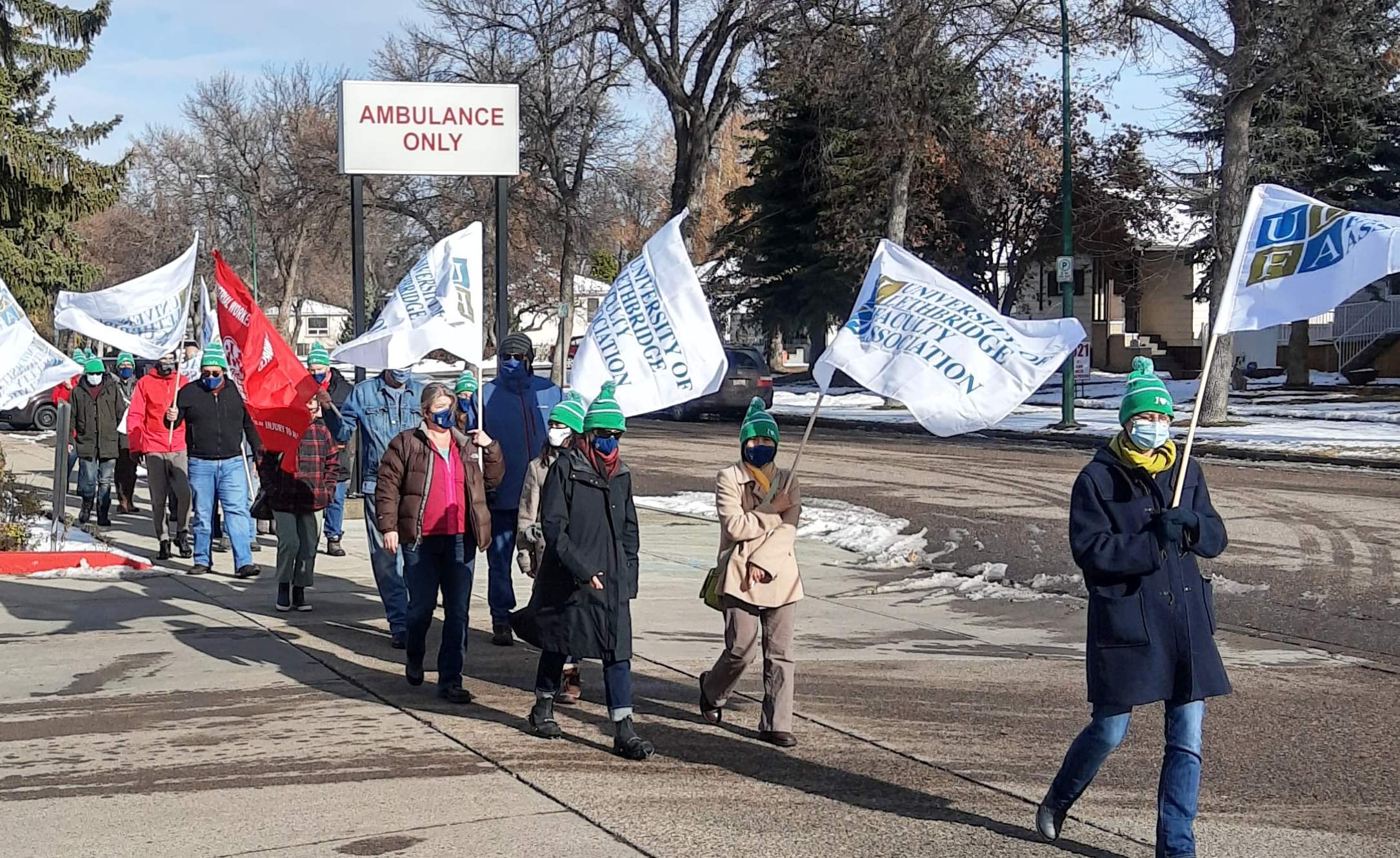
Picket by University of Lethbridge faculty at Chinook Hospital, October 27, 2020, in support of
health care workers.
New Outbreak at Olymel's Meat Processing Plant in Vallée Jonction, Quebec
• Workers' Proposals Must Be at the Centre of Solutions to Curb
COVID-19
- Normand Chouinard
Ontario Government Bill on Long Term Care
• Ford Government Protects Long-Term Care Operators from Liability
- Steve Rutchinski
Striking Alberta Hospital Workers Ordered Back to Work
- Dougal MacDonald -

On
Monday, October 26, hospital workers, members of the Alberta Union of
Provincial Employees (AUPE), walked off the job. AUPE reports that
walkouts took place in close to 39 cities and towns and 49 workplaces
across Alberta. On Monday night, the Alberta Labour Relations Board
(ALRB) ordered the striking AUPE workers back to work, claiming that
the action contravened Alberta's Labour Relations Code.
The speed of the decision was in stark contrast to the long-drawn-out
procedures followed whenever an employee complaint is made.[1]
The Alberta Labour Relations Code perpetuates the
existence of the all-powerful ALRB. Under the Code, all labour disputes
are removed from the public courts and decided by the Board which is
composed of persons appointed by the government.
The aim of the ALRB is to streamline and speed up
settlement of labour disputes to try to ensure "industrial peace" so
the rich can continue to be paid without disruption. To this end, the
ALRB has been given sweeping, dictatorial powers. It can conduct
inquiries and hearings, issue orders and directives, make rules,
determine which unions
shall represent which workers, decide when a collective agreement is in
effect, demand the production of records and documents, require
statements to be furnished, enter and inspect union premises, question
employees, restrict picketing, levy fines, decertify unions, etc. The
ALRB is almost like a legislative body which makes up its own rules as
it
goes along.
It
is said that the 45-member ALRB is neutral and "fair" to the workers
because it includes trade unionists (including some from AUPE).
However, the union representatives on the ALRB have no independence and
can only apply the statutes of the Code. They have no power to make or
amend any of the legislation to make it favourable to the workers. The
anti-worker Bill 32, the so-called Restoring Balance in Alberta’s Workplaces Act, 2020
removed the discretionary power of the ALRB with regard to the court
filing of an order made with regards to an “illegal strike or
lockout.” The Board must now file the order with the Court on the
request of a Party, which in this case would be Alberta Health
Services. On filing, the order is enforceable as a judgment or order of
the Court, which means that failure to comply with the order can be
considered contempt of court.
An objective analysis of Alberta's Labour Relations Code
reaffirms workers cannot rely on legislation or government boards to
serve their interests. The Code illustrates that the employers have the
entire power of the state on their side while the workers' only weapon
is the force of their organized numbers as was seen in their actions on
October 26. The government may have prevailed in imposing its "rule of
law" through the decision of the labour board which automatically
becomes a decision of the courts. But the government scored no win
in the court of public opinion. Across Alberta widespread support and
solidarity is being expressed for the hospital workers. People are
speaking out to denounce the government and saying that it is utterly
contemptible to use the pandemic as a pretext to launch these attacks
on workers. The
workers must build their own powerful opposition based on their own
thinking, perspective, and program in order to defend their own rights
and the rights of all.

Note1.
For example in May 2020 United Food and Commercial Workers Union Local
401 asked that the Alberta Labour Relations Board (ALRB) hold an
emergency hearing and requested "interim relief," pointing to the
irreparable harm if workers at Cargill were required to return to work
without their union being able to determine if they could do so safely.
WF pointed out at the time:
“It is difficult to imagine a
situation more fraught with the danger of irreparable harm, with half
of the workers already positive for COVID-19, the death of a worker and
close contact, and others who are seriously ill in hospital, some in
intensive care. Despite the clear urgency of the matter and where 85
per cent of the workers had indicated that they felt it was unsafe to
work, the ALRB set the hearing date for May 7, three days after the
plant was to reopen, and appointed a mediator to meet with the parties
over the weekend.” (Workers’ Forum, May 7 2020)

New Outbreak at Olymel's Meat Processing Plant in Vallée-Jonction, Quebec
- Normand Chouinard -
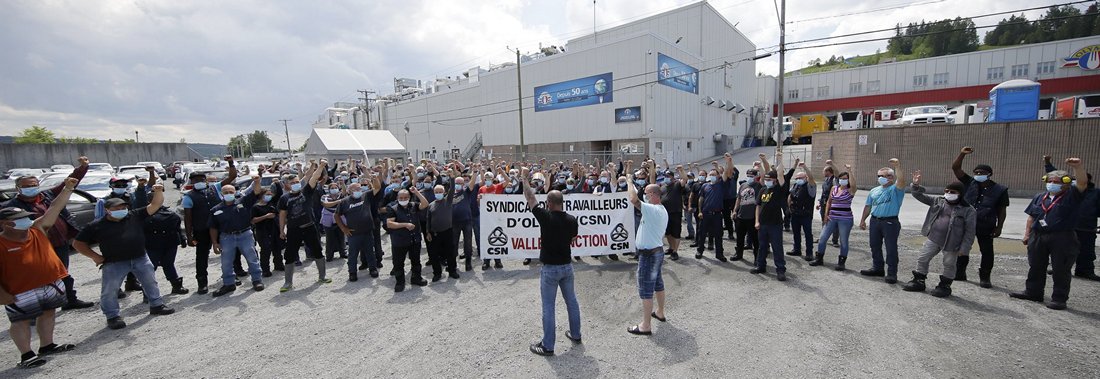
Vallée-Jonction workers protest withdrawal of pandemic pay, June 23, 2020 How to practically solve the problem of mobilizing the vast
majority of workers in discussion and decision-making to fight the
pandemic is key at this time. Quebec's National Public Health Institute
and its Director, Dr. Horacio Arruda, stated on October 20 that 46 per
cent of the current outbreaks in the second wave of the pandemic in
Quebec are happening in workplaces. It clearly makes sense that workers
have a role to play in addressing this situation.
This task seems straightforward enough, but it is facing many
obstacles. The reason for this is that the current forms of public
authority block the participation of workers in decision-making and the
search for solutions.
Olymel's pork slaughtering and butchering plant in Vallée-Jonction
is a revealing example. At the beginning of the pandemic, this plant
experienced a significant number of COVID-19 cases. This was followed
by an ensemble of sanitary measures and the creation of a specific
protocol for this type of industry. The Public Health Institute, the
Labour Standards, Pay Equity and Workplace Health and Safety Board
(CNESST), Olymel management and, to a certain extent, municipal, Quebec
and federal elected officials participated in the discussion and
decisions regarding the directives to be adopted. It should be
remembered that the Olymel Vallée-Jonction Workers' Union, which is
affiliated with the Confederation of National Trade Unions (CSN) was
not given a real say as the representative of more than 800 production
workers. In particular, the union had proposed several measures for
physical distancing on the production lines and the company did nothing
to implement them.
The application of the protocols and the monitoring of health
guidelines were supposed to reduce the risk of contagion in the plant.
 However, we recently learned that a second major outbreak of
COVID-19 at this plant is again raising the problem of how to curb
contagion in the agri-food industry, an industry that is very high risk
and at the same time, essential. So far, there are at least 114
COVID-19 cases in this plant, and most sadly, the death of one
worker. However, we recently learned that a second major outbreak of
COVID-19 at this plant is again raising the problem of how to curb
contagion in the agri-food industry, an industry that is very high risk
and at the same time, essential. So far, there are at least 114
COVID-19 cases in this plant, and most sadly, the death of one
worker.
Following
this new outbreak, the same authorities who were there this spring held an urgent meeting to follow up on the situation. The
Chaudière-Appalaches Regional Public Health Department (DRSP) decided
to test almost all of the employees.
Olymel's senior management rejected the union's proposal to close
the plant for two weeks, citing its obligation to respect contracts
with its customers and the need to avoid an overload of live hogs that
could not be slaughtered if the plant was closed. This is a problem
that arose this spring during the complete closure of its plant in
Yamachiche. It should also be mentioned that neither the DRSP or the
CNESST recommended the closure of the plant, which, according to
information gathered by Workers' Forum, created a lot of discontent among the workers.
According to Martin Maurice, President of the Olymel Vallée-Jonction
Workers' Union-CSN, the company's relaxation of sanitary measures over
the summer may have facilitated this new outbreak. "We would like to
convey our condolences to the family and loved ones of our deceased
colleague. For us, one death is one too many," he said on
the union website. "From the first wave of the pandemic, we demanded
protective measures to adequately protect all workers at the plant.
However, this past summer, we questioned the employer in connection with the
relaxation of certain health measures that had been put in place to
prevent any outbreak. The return of overtime and the cancellation of
the 10-minute buffer period between shifts are two concrete examples of
this relaxation. Also, several subcontractors are working at the plant
and we don't even know if they are respecting the protective measures
that are in place regarding movement from one workplace to another." He
also said that the lack of training of some workers may have
contributed to the outbreak.
 Although the Vallée-Jonction workers consider that the authorities
involved in the fight against the pandemic each have a role to play,
they do not accept being sidelined or participating only in some
consultations. They are well aware that at the end of the day their
proposals will likely be rejected, as has been the case since the
beginning of
the pandemic. The workers are engaged in a battle to decide who will
become the driving force in making decisions that affect them, and this
goes beyond mere consultation. They want to participate directly in the
major decisions related to production, notably the pace of work, the
organization of production on the lines, safe bus transportation
procedures for temporary foreign workers, the movement of workers
between departments, overtime and schedules. They are refusing to
simply be subjected to the decisions made by the authorities. They want
to affirm themselves as a new decision-making authority that must be
relied on to find solutions to the problems caused by the pandemic.
The more workers engage in discussion and decision-making, the more
influential their authority will be. Although the Vallée-Jonction workers consider that the authorities
involved in the fight against the pandemic each have a role to play,
they do not accept being sidelined or participating only in some
consultations. They are well aware that at the end of the day their
proposals will likely be rejected, as has been the case since the
beginning of
the pandemic. The workers are engaged in a battle to decide who will
become the driving force in making decisions that affect them, and this
goes beyond mere consultation. They want to participate directly in the
major decisions related to production, notably the pace of work, the
organization of production on the lines, safe bus transportation
procedures for temporary foreign workers, the movement of workers
between departments, overtime and schedules. They are refusing to
simply be subjected to the decisions made by the authorities. They want
to affirm themselves as a new decision-making authority that must be
relied on to find solutions to the problems caused by the pandemic.
The more workers engage in discussion and decision-making, the more
influential their authority will be.
Workers are learning, in their struggle for safety and through their
daily relationships and interactions in the production process, to
become decision-makers.
This struggle is raging in many workplaces in Quebec and Canada in
the context of the fight against the pandemic. It is precisely the
workers' success in this battle that the old forms of authority want to
stop by preventing workers from becoming a new public authority.

Ontario Government Bill on Long-Term Care
- Steve Rutchinski -  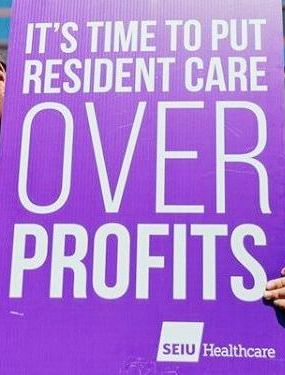
Those responsible for the deplorable record of COVID-19
transmission and deaths in Ontario's long-term care homes have received
a "get out of jail free" card. Ontario Bill 218, the Supporting Ontario's Recovery and Municipal Elections Act, 2020[1]
prohibits legal action against those whose
actions or inactions resulted in the high number of deaths of seniors
in Ontario's long-term care facilities, unless gross negligence can be
proven. The bill was referred to the Standing Committee on Justice
Policy following second reading on October 27. Many legal opinions have
already been given and it is generally agreed that "gross negligence"
is a very high bar to meet.
Schedule 1 of the bill, entitled Protection from Liability,
"provides that no cause of action arises against any person as a direct
or indirect result of an individual being or potentially being infected
with or exposed to coronavirus (COVID-19) on or after March 17, 2020 as
a direct or indirect result of an act or omission of the person if,
"(a) at the relevant time, the person acted or made a good faith
effort to act in accordance with, (i) public health guidance relating
to coronavirus (COVID-19) that applied to the person, and
(ii) any federal, provincial or municipal law relating to coronavirus (COVID-19) that applied to the person; and
"(b) the act or omission of the person does not constitute gross negligence."
Dotting the "i" of impunity, the bill specifies that "good faith effort' includes an honest effort, whether or not that effort is reasonable." (Emphasis added.)
The bill also makes sure to:
- bar future legal proceedings: "No proceeding that is directly or
indirectly based on or related to anything referred to in subsection
(1) may be brought or maintained against a person."
- dismiss legal proceedings in progress: "Any proceeding referred to
in subsection (4) that is commenced before the day this Act comes into
force is deemed to have been dismissed, without costs, on the day this
Act comes into force."
- prohibit compensation: "No person is entitled to any compensation
or any other remedy or relief for the extinguishment or termination of
rights under this Act."
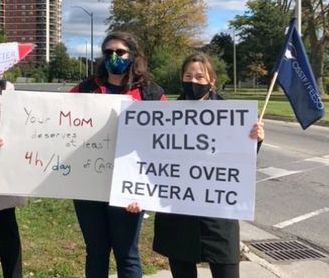 The bill apparently has no effect, however, on the Workplace Safety and Insurance Act:
"Nothing in this Act affects the exclusive jurisdiction of the
Workplace Safety and Insurance Appeals Tribunal to determine a matter
described in subsection 31 (1) of the Workplace Safety and Insurance Act, 1997." The bill apparently has no effect, however, on the Workplace Safety and Insurance Act:
"Nothing in this Act affects the exclusive jurisdiction of the
Workplace Safety and Insurance Appeals Tribunal to determine a matter
described in subsection 31 (1) of the Workplace Safety and Insurance Act, 1997."
Canada's record of COVID-19 infections and deaths in long-term care
facilities, especially for-profit privately owned corporate long-term
care businesses, is appalling. In June, as the first wave was settling
down, long-term care residents accounted for 81 per cent of all
reported COVID-19 deaths in Canada, compared with an average of 38 per
cent in other OECD countries. In Canada, more than 9,650 long-term care
staff members were infected by COVID-19, representing more than 10 per
cent of the country's total cases.[2]
The Ontario Health Coalition (OHC) reports that at least two dozen
legal actions have been filed as a result of the conditions in
long-term care homes and the responses to the spread of the virus,
during the first wave of the COVID-19. The OHC has a list of legal
actions in progress in the Briefing Note section of their website.[3]
One such case is a class action suit "against Chartwell Retirement
Residences and Long-Term Care Homes for their alleged failures in
outbreak planning, precautions and response relating to COVID-19
resulting in preventable resident deaths and unnecessary suffering for
their family members. [...] brought on behalf of all persons who live
or
lived at a Chartwell Home from January 10, 2020 to the end of the
pandemic date, which is currently unknown."
 Seventy-seven
people died in four Chartwell facilities in the first wave. Another
nine residents have died at one Chartwell location thus far in the
second wave, as of October 25, and at least 16 staff have contracted
COVID-19 at various Chartwell homes since the second wave outbreaks.
Chartwell operates eleven long-term care homes in
Ontario. Seventy-seven
people died in four Chartwell facilities in the first wave. Another
nine residents have died at one Chartwell location thus far in the
second wave, as of October 25, and at least 16 staff have contracted
COVID-19 at various Chartwell homes since the second wave outbreaks.
Chartwell operates eleven long-term care homes in
Ontario.
Granting protection from prosecution to those responsible for what
is a national disgrace and considered by many to be an outright crime
is outrageous. The rich have the power to act, or not to act, with
impunity. Do we need more clear evidence that this is a democracy of
the rich, for the rich? These days will not be forgotten and the time
will come when those responsible are held to account!
Notes 1. The full official name of Bill 218 2020 is An
Act to enact the Supporting Ontario's Recovery Act, 2020 respecting
certain proceedings relating to the coronavirus (COVID-19), to amend
the Municipal Elections Act, 1996 and to revoke a regulation.
2."Pandemic Experience in the Long-Term Care
Sector: How Does Canada Compare With Other Countries?" CIHI Snapshot,
June 2020, Canadian Institute for Health Information, Ottawa, ON.
3. Ontario Health Coalition, Briefing Note: COVID-19 in Long-Term Care Litigation & Legal Actions. 
(To access articles individually click on the black headline.)
PDF
PREVIOUS
ISSUES | HOME
Website: www.cpcml.ca
Email: office@cpcml.ca
|

